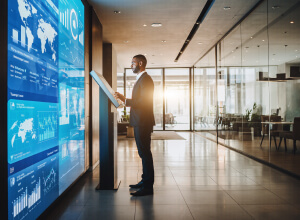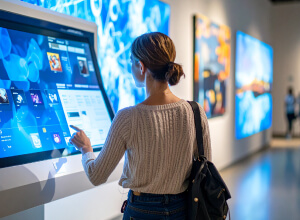The Future of Digital Curation: Transforming Art Galleries

Explore how digital curation is reshaping art galleries and museums, enhancing visitor experiences, and transforming the way we engage with art in the future
Welcome to the future of art curation, where technology meets creativity to redefine how we experience and interact with art! As art galleries and museums evolve in response to technological advancements, digital curation solutions are essential in modernizing these cultural spaces. In this article, we explore how digital technology is reshaping art galleries, showcasing key trends, benefits, challenges, and the potential for future innovation.
1. What is Art Curation?
Art curation is the meticulous selection and arrangement of artworks to create narratives that provide an engaging experience for visitors. However, these narratives could only be communicated through static signage that competes with the artwork. In addition, curators are limited to the works in their galleries' possession and cannot share an artist's complete portfolio.
2. Key Technologies for Digital Curation
- Interactive Displays : Interactive kiosks and digital signage enhance visitor engagement by providing detailed information, artist interviews, and multimedia content. These digital art management systems make exhibitions more dynamic, allowing visitors to engage with art on a deeper level.

- Digital Catalogs and Archives: Maintaining digital records and publishing an online art catalog offers numerous benefits, including improved accessibility, efficient data management, and streamlined operations. These digital archives ensure that art collections can be shared outside the gallery's four walls.

- Virtual and Augmented Reality: Virtual reality (VR) and augmented reality (AR) have revolutionized how art is experienced. Visitors can immerse themselves in VR art installations or use AR apps to view additional layers of information about artworks. This technology offers an interactive art display technology that transforms passive viewing into an engaging experience.

3. Benefits of Digital Curation for Art Galleries
- Enhanced Visitor Experience: By incorporating digital tools, galleries can create immersive and interactive experiences that captivate audiences. This increases the length of stay, the volume of repeat visits, and word-of-mouth recommendations.
- Expanded Reach: Online and virtual exhibitions enable galleries to reach a broader audience, breaking geographical barriers and attracting art lovers worldwide.
- Improved Data Management: With digital art management systems, galleries can effectively organize and analyze collection data, leading to informed decision-making and permitting staff to focus on curatorial and creative endeavors.
4. Case Studies and Examples
Several art galleries have successfully integrated digital curation solutions, setting benchmarks for the industry. For example, the Mori Art Museum in Tokyo used AR to enhance its "Roppongi Crossing" exhibition, providing visitors with additional contextual information via their smartphones. Similarly, the Rijksmuseum in Amsterdam has developed a comprehensive digital catalog that offers in-depth insights into its vast collection .
5. Conclusion
In conclusion, the integration of digital curation solutions in art galleries is not just a trend but a necessary evolution to stay relevant in the digital age. Whether you're an art curator, exhibit designer at a museum, or tech enthusiast, exploring these innovations can provide opportunities for growth and engagement. If you're ready to take your gallery to the next level, consider exploring interactive kiosk solutions for art to enhance your exhibitions.
Check out our linked articles on digital curation solutions and museum and gallery tech solutions for further reading. To learn more or get in touch, contact us today and join the conversation on the future of art curation.





